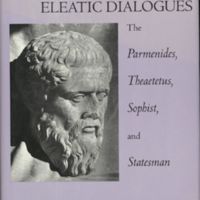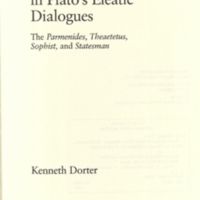Form and good in Plato's Eleatic dialogues: the Parmenides, Theaetetus, Sophist, and Statesman
Dublin Core
Title
Form and good in Plato's Eleatic dialogues: the Parmenides, Theaetetus, Sophist, and Statesman
Description
Plato's four dialogues are treated here for the first time as a continuous argument. In Dorter's view, Plato re-examines the theory of forms propounded in his earlier dialogues and reaffirms them, not as perfectly robust tools in the service of human knowledge, but as absolutely essential. Thus, Dorter contradicts both those philosophers who would argue that Plato espoused uncritically his initial theory of forms throughout his work and those philosophers who would argue that Plato in some sense rejected the theory of forms and moved toward the kind of categorical analysis later developed by Aristotle. The reader is thus presented with a controversial and novel explanation of the function of the four dialogues discussed. Dorter presents the Parmenides as a serious critique, not retraction, of the theory of forms. The Parmenides shows that ultimately theory must fall back upon metaphor and analogy - i.e., upon the forms - because alternative approaches are subject to even greater limitations. Theaetetus purposefully fails to give a satisfactory account of knowledge because it ignores the forms. The Sophist reintroduces one aspect of the forms, universal kinds, but abstracts from the forms' grounding of value, again demonstrating the inadequacy of an alternative approach. In the Statesman, the concept of the value-bestowing mean is reintroduced, and with this, both the metaphorical nature and value-grounding aspects of the forms are vindicated: from this perspective the subsequent reappearance of the theory of forms in the Philebus is no longer surprising. Plato's belief that ontological thinking can transform us not only intellectually but also morally, supported by a long tradition in both Western and Eastern philosophy, has been eclipsed by philosophical trends in the past century. Among the influential theoretical movements of the twentieth century there is virtually unanimous agreement that there is no ontological basis for value - all moral judgments become "subjective." Dorter's re-examination of the insights of Plato implies a new direction for modern philosophical inquiry.
Creator
Kenneth Dorter
Publisher
Berkeley : University of California Press.
Date
1994
Text Item Type Metadata
Original Format
Book
Citation
Kenneth Dorter, “Form and good in Plato's Eleatic dialogues: the Parmenides, Theaetetus, Sophist, and Statesman,” Humanities Hub, accessed February 26, 2026, https://humanitieshub.sdsu.edu/omeka/items/show/1439.


